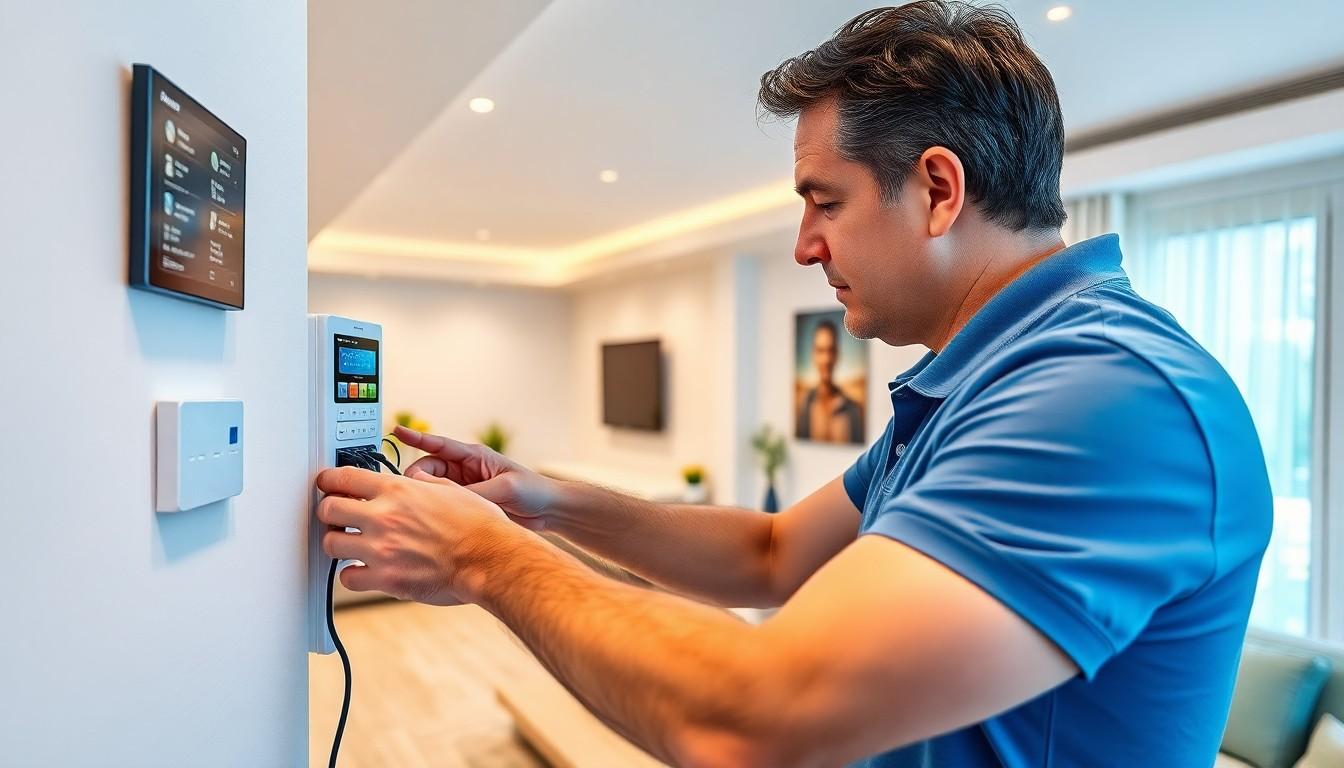Imagine walking into your home and having the lights dim just right, the thermostat adjust to your perfect temperature, and your favorite playlist start playing—all without lifting a finger. Sounds like magic, right? Well, it’s not. It’s the world of home automation, and a skilled home automation installer is your wizard.
Table of Contents
ToggleOverview of Home Automation Installers
Home automation installers play a crucial role in integrating various automated features in residences. Their expertise ensures smooth operation of systems like lighting, climate control, and entertainment.
What Is Home Automation?
Home automation refers to the technology that enables remote or automatic control of home systems. Automated systems allow users to manage aspects such as lighting, security, and climate through smartphones or voice commands. This technology enhances convenience, efficiency, and security in daily living. Homeowners appreciate the ability to customize settings based on personal preferences, making their environments more comfortable. Energy savings also result from automated control of devices, contributing to lower utility bills and a smaller carbon footprint.
Importance of Professional Installation
Professional installation stands out as vital for effective home automation. Qualified installers ensure all components work together seamlessly, avoiding potential functionality issues. Proper setup also minimizes security vulnerabilities that may arise from incorrect installations. Home automation systems require precise configuration and integration with existing infrastructure, making skilled installers essential. Professional services often include system design, installation, and ongoing support, offering homeowners peace of mind. Choosing an experienced installer also maximizes the potential benefits of automation, creating a tailored experience that meets specific needs.
Qualities of a Good Home Automation Installer

A good home automation installer possesses specific qualities that ensure effective integration of technology within a home. Those qualities contribute significantly to the overall customer experience and system functionality.
Technical Skills and Expertise
Technical skills and expertise form the foundation of a competent home automation installer. They should understand various systems, software, and hardware required for home automation. Knowledge of networking and security principles is critical as this promotes seamless communication between devices. Proficiency in troubleshooting ensures timely resolution of any installation issues, minimizing disruptions. Familiarity with current trends and technologies keeps installers updated, allowing them to provide homeowners with innovative solutions. Demonstrating competence through certifications can build trust with clients, reinforcing the belief they made the right choice in their installer.
Customer Service and Communication
Strong customer service and communication skills are essential for a successful home automation installer. Installers must listen actively to clients’ needs and preferences to create tailored solutions. Clear communication about project timelines, costs, and expectations prevents misunderstandings, fostering a positive relationship. They should be approachable, addressing client concerns promptly and effectively. Offering ongoing support after installation demonstrates commitment to customer satisfaction. Installers who explain technical concepts in simple terms empower homeowners, making them feel comfortable with their new systems. Building rapport leads to better collaboration, ultimately enhancing the overall automation experience.
Services Offered by Home Automation Installers
Home automation installers provide a variety of services tailored to improve residential living experiences. Their expertise ensures homeowners can fully utilize the advantages of automated systems.
Smart Home System Integration
Smart home system integration involves connecting multiple devices to function harmoniously. Installers assess a home’s layout, recommend suitable devices, and facilitate their installation. They often work with lighting, temperature controls, and security systems, ensuring seamless communication between components. Skilled installers prioritize compatibility among systems to enhance user experience. Additionally, they incorporate user-friendly interfaces, allowing homeowners easy control of their automation features. Customization options often exist, enabling residents to tailor settings to their preferences. Ultimately, effective integration leads to a cohesive smart home environment.
Maintenance and Support Services
Maintaining automated systems is crucial for optimal performance. Home automation installers provide ongoing support, including troubleshooting and updates. Regular maintenance checks help identify potential issues before they escalate. Many installers offer service packages that include installation of software updates and device replacements. Prompt response times for service requests enhance customer satisfaction. Through reliable support, homeowners feel confident in their systems’ security and functionality. Understanding system intricacies allows installers to educate clients on best practices, reinforcing their capabilities. Such comprehensive services ensure automated homes remain efficient and secure over time.
Tips for Choosing the Right Home Automation Installer
Choosing the right home automation installer involves careful consideration of various factors to ensure a successful installation and integration of automated systems.
Researching Credentials and Reviews
Evaluating credentials and reviews is essential in selecting a professional home automation installer. Look for installers with appropriate certifications and training in smart home technology. Those that maintain industry-standard certifications, such as CEDIA or HAA, demonstrate commitment to expertise. Reading customer reviews helps gauge satisfaction levels, revealing insights about the installer’s reliability and communication. Websites like Angie’s List or HomeAdvisor feature comprehensive reviews that inform decision-making. Trustworthy installers often provide case studies or testimonials highlighting their past work. Prioritizing transparent feedback ensures homeowners engage with professionals who excel in delivering results.
Getting Multiple Quotes and Estimates
Obtaining multiple quotes is crucial for comparing services and pricing. Start by reaching out to several home automation installers to receive detailed estimates that outline each service clearly. Each quote should reflect the specific needs and complexities of the installation. Homeowners benefit from asking follow-up questions about the scope of work included in the estimates. Installers who provide itemized quotes make it easier to assess costs and services involved. Comparing estimates assists in identifying the best fit based on budget and project requirements. Prioritizing transparency in estimates fosters informed decision-making and ultimately results in a more satisfactory installation experience.
Home automation transforms living spaces into efficient and convenient environments. A skilled home automation installer plays a vital role in this transformation by ensuring that all systems integrate seamlessly. Their expertise not only enhances functionality but also boosts security and user satisfaction.
By choosing a qualified installer, homeowners can enjoy tailored solutions that meet their specific needs. The right professional brings technical knowledge and excellent customer service, making the installation process smooth and stress-free. With ongoing support and maintenance, homeowners can rest assured that their automated systems will perform optimally for years to come. Investing in professional installation is a crucial step toward enjoying the full benefits of home automation.




